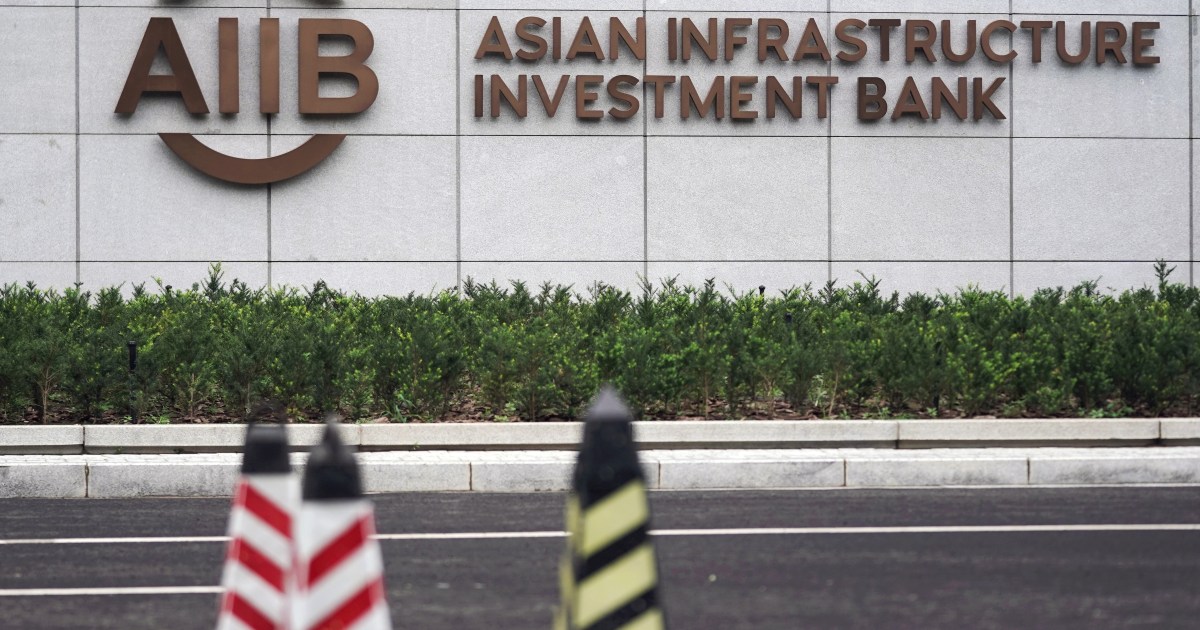Chinese-Led Development Bank Halts Operations in Russia and Belarus | Russo-Ukrainian War
A Chinese-led development bank has suspended all business with Russia and Belarus, a possible sign of the limits of Beijing’s support for Moscow as it faces sanctions and censorship over its war in Ukraine.
The Asian Infrastructure Investment Bank (AIIB) said it had suspended all activities related to the two countries in light of “economic and financial developments”.
“Under these circumstances, and in the best interest of the Bank, management has decided that all activities relating to Russia and Belarus are suspended and under review,” the Beijing-based institution said Thursday in a statement. a statement.
The multilateral development bank, which has 105 members worldwide, did not specify the reasons for its decision, but expressed “its thoughts and sympathy to all concerned”.
“Our hearts go out to all who are suffering,” the bank said.
This announcement comes after several Chinese public financial institutions, including the Bank of China, stopped financing transactions involving Russian commodities.
Gary Ng, senior economist at Natixis in Hong Kong, said the AIIB’s decision was “symbolic” because the bank has only financed two projects in Russia to the tune of $800 million and none in Belarus.
“Even though most cross-border lending from China to Russia may take place with political banks, this is yet another example that China cannot unconditionally support Russia as it would weigh its own benefits and costs of any move. geopolitics,” Ng told Al Jazeera.
“The withdrawal of the AIIB shows that the pressure of global financial sanctions on Russia has become more apparent in supranational organizations,” Ng added.
Development of Sino-Russian relations
China and Russia have grown increasingly close in recent years, often aligning themselves against perceived interference by the United States and its allies.
Last month, Chinese President Xi Jinping and Russian President Vladimir Putin said the friendship between their countries had “no limits” and no “prohibited” areas of cooperation.
Beijing has refused to condemn Moscow’s invasion of Ukraine, refrained from participating in a United Nations resolution calling on Putin to withdraw his forces, and expressed opposition to “all unlawful unilateral sanctions”.
Last month, Chinese customs authorities lifted import restrictions on Russian wheat, an industry worth around $7.9 billion a year, fueling speculation that the Chinese market could become a a key economic lifeline for the beleaguered Russian economy, which faces unprecedented international isolation.
The two sides have also stepped up energy cooperation, including signing a 30-year contract last month for Russia to supply gas to China through a new pipeline.
Despite deepening ties, Beijing is widely seen as reluctant to openly violate sanctions, which could put it at risk of being cut off from Western export markets and the U.S. dollar-centric international financial system.
China’s trade with Russia stood at $146.9 billion in 2021, about a tenth of its combined trade with the United States and the European Union.
Tim Harcourt, chief economist at the Institute for Public Policy and Governance at the University of Technology Sydney, called the AIIB’s decision significant “even given the little work done in Russia” by the development bank.
“It shows that China is moving away from Russia and the ‘limitless partnership’ between Xi and Putin,” Harcourt told Al Jazeera.
However, Peter Lewis, a former investment baker who runs a consultancy firm in Hong Kong, questioned whether the AIIB’s decision suggested a weakening of Beijing’s support for Moscow, saying the bank had an obligation to make sound financing decisions independent of its shareholders.
“Beijing will present this as an independent decision made by the AIIB for financial stability and prudence purposes,” Lewis told Al Jazeera. “However, I am sure that Beijing is increasingly alarmed by what is happening in Ukraine and that there are frantic discussions going on with the Chinese Ministry of Foreign Affairs. But this decision by the AIIB does not reflect really that.
China’s Xi launched the AIIB in 2016 as an alternative to the World Bank and the International Monetary Fund, financial institutions seen as dominated by Western interests. China is the AIIB’s biggest shareholder, with 31% of the bank’s $20 billion paid-up capital.


Comments are closed.